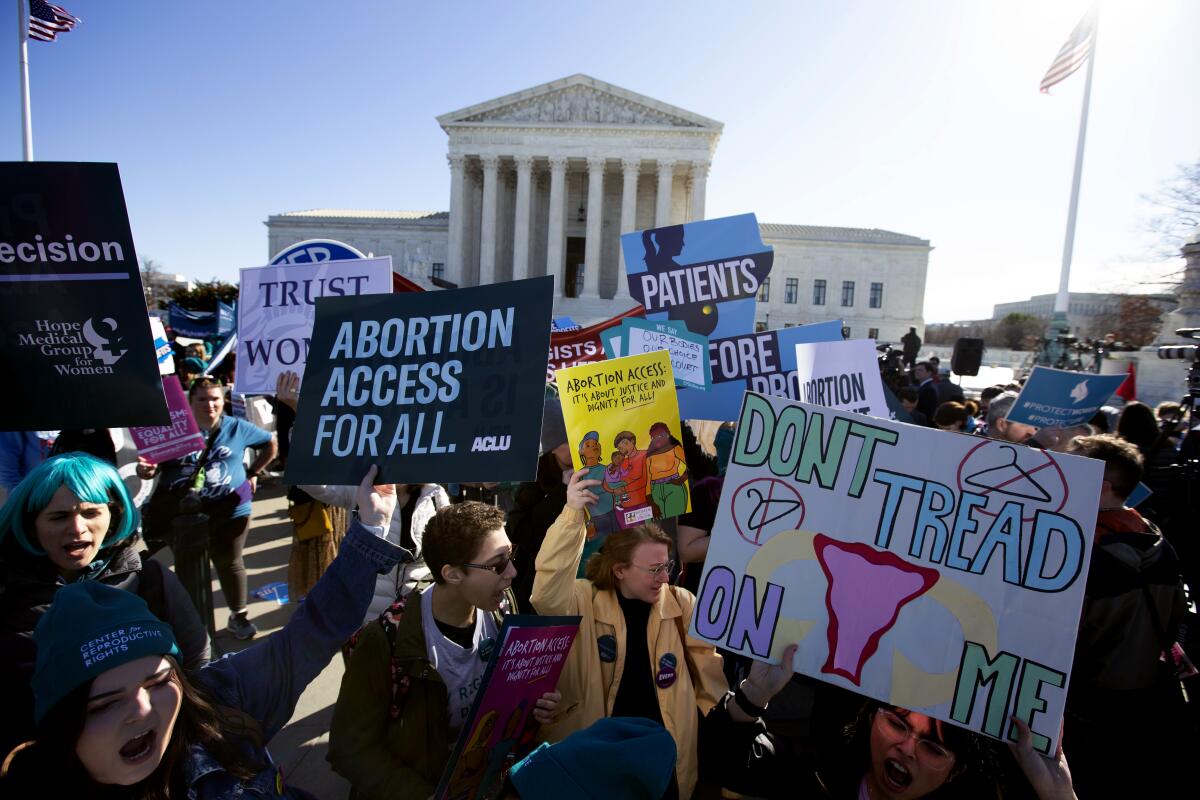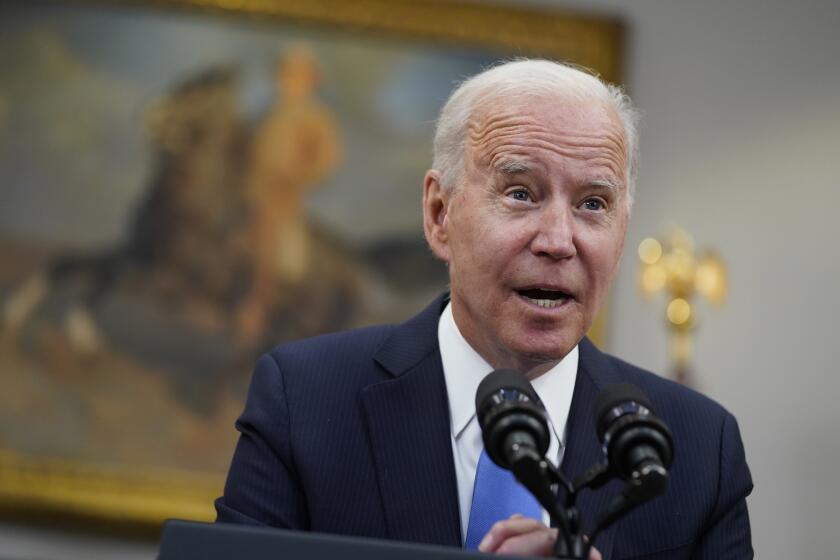Why Congress must abolish the most destructive abortion restriction ever passed

- Share via
Three years after the Supreme Court legalized abortion in Roe vs. Wade in 1973, Congress made it significantly harder for low-income women to access the procedure by passing the Hyde Amendment, which bans federal Medicaid funding for abortions. It was upheld by the Supreme Court in 1980 — and remains in effect.
In our view it is the most destructive abortion restriction ever passed.
Finally, there is a chance to abolish it. Joe Biden is the first president in more than two decades to exclude this discriminatory provision in a proposed federal budget. Since Democrats have narrow majorities in Congress, he’ll need help from brave Republicans who support abortion rights to eliminate it.
Named for abortion rights opponent Rep. Henry Hyde of Illinois, this harsh amendment survived by hiding behind a veneer of reasonableness. Even if you support someone’s right to choose abortion, Hyde argued, taxpayers should not have to pay for it. Members of Congress on both sides of the aisle agreed, and it has been a part of federal spending laws ever since. They closed their eyes to the amendment’s harmful and unfair effect on low-income women.
A disproportionate number of those affected by the funding ban each year are women of color: Twenty-nine percent of Black women and 25% of Hispanic women of reproductive age were enrolled in Medicaid as of 2019, compared with just 15% of white women. The lack of funding uses the government’s power of the purse to put abortion out of reach for Medicaid recipients while still fully funding childbirth.
Over the years, the Hyde Amendment has provided a variety of narrow exceptions to the ban on Medicaid funding — today it pays for abortion only if the woman’s life is in danger or the pregnancy resulted from rape or incest.
The amendment’s impact is enormous. A first-trimester abortion is prohibitively expensive for women on Medicaid; the cost of the procedure is about $500, plus there are related expenses such as lost wages, child care and transportation.
According to our research, Hyde’s amendment inspired a wide range of copycat bans that continue to deny abortion coverage in the Children’s Health Insurance Program and other federal programs that cover military personnel and veterans, Native Americans, Peace Corps volunteers and people imprisoned or detained by the federal government.
Biden’s $6-trillion budget for the fiscal year starting Oct. 1, coming Friday, calls for big increases. But the total mostly maintains funding for existing programs.
At the state level, we found that the amendment made it politically acceptable to carve out abortion coverage in state employee insurance plans and even insurance coverage provided by private employers. In contrast, six states — California, Illinois, Maine, New York, Oregon and Washington — mandate abortion coverage in their health insurance marketplaces and in private health plans.
States can use their own funds to pay for abortion services if they so choose, or when ordered to do so by state court rulings that provide greater reproductive rights. We’ve seen how litigation combined with strong legislative advocacy — led by Black women and their allies — has persuaded several states to fund abortion under their Medicaid programs. Today, 16 states, either through court order or legislation, allow Medicaid-eligible residents to obtain funding for all or most abortions.
But 33 states and Washington, D.C., still conform to the severe federal Hyde standards. (South Dakota only pays for abortion in life-endangering cases.)
As more progressive women, including more women of color, have been elected to Congress, the repeal of funding restrictions on abortion has gained more support. President Biden, who supported the Hyde Amendment during his years in the Senate, has had a change of heart, proposing a 2022 federal budget that would close the door on it.
Simply excluding Hyde from the federal budget is not enough. The proposed Equal Access to Abortion Coverage in Health Insurance Act, which was recently reintroduced in Congress, must be passed. It would ensure abortion coverage for everyone who receives care or insurance through the federal government and prohibit political interference with abortion coverage in private insurance plans.
At the local level, more funding is being made available for abortion services and related expenses through philanthropic organizations and city programs that will continue to be important long after Hyde disappears. For instance, New York City has allocated more city dollars to fund abortions for anyone traveling there for care and Austin, Texas, is providing support for women seeking abortions by funding lodging and travel expenses.
As new proposals for healthcare coverage are debated and considered, those who value reproductive freedom must advocate to ensure that the full range of reproductive health services — including abortion — are firmly and securely part of everyone’s coverage. Preserving reproductive freedoms requires not just the right but the means to obtain all reproductive healthcare, regardless of financial status. Hyde’s harmful amendment has bullied those choosing abortion for far too long — and far too unfairly.
Kathryn Kolbert is a lawyer and co-founder of the Center for Reproductive Rights. Julie F. Kay is a human rights lawyer who has argued for abortion rights internationally. They are the authors of the forthcoming “Controlling Women: What We Must Do Now to Save Reproductive Freedom.”
More to Read
A cure for the common opinion
Get thought-provoking perspectives with our weekly newsletter.
You may occasionally receive promotional content from the Los Angeles Times.










